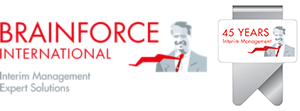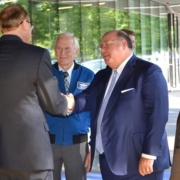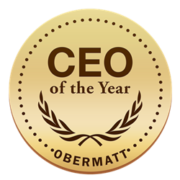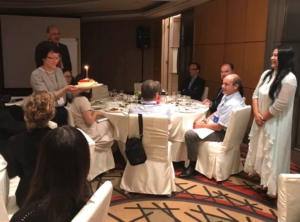Something new about Interim Management
On our news page we publish articles on current topics about interim management, project management and consulting news, interesting events and impressions.
The Brainforce team wishes you pleasent reading of this articles.
The Benefits Of Interim Management

Finance Monthly is a global publication delivering news, comment and analysis to those at the centre of the corporate sector. Finance Monthly reports on the news and topics that matter to the CEOs, CFOs, investors, company directors, entrepreneurs, and SMEs that make up our valued readership.
Why and when should companies need interim managers?
Here, Martin Schneider from the Brainforce Group tells us more about his company and the benefits of interim management.
The BRAINFORCE Group has been a leader in interim management and expert solutions for almost 40 years. Headquartered in Zurich, Switzerland, the company has subsidiaries in Europe, the Baltics, Russia, Africa and Asia, as well as a strong network of partners in the Americas.
In your opinion, how important is it to have first-hand experience of running a business in order to be an effective interim manager and to provide valuable insight to other business leaders?
Business leaders are typically people with strong self-confidence about their knowledge, capabilities and skills. If they realise that their counterpart has an equivalent level of knowledge and experience, they tend to trust and accept them. Interim Managers are usually needed in difficult, non-routine situations. The goal is to achieve sustainable results as quickly as possible, based on their past learning curve, an above-average ability to lead and motivate people, and last but not least – an entrepreneurial mindset. The same way a ‘silverback ranger’ knows his forest inside-out, an interim CEO knows his profession and has been successfully steering operations through tough challenges for years.
Why is an interim manager more effective to optimise organisations? How can cultural and historical challenges be overcome?
I believe that a manager who has previously led, optimised or restructured e.g. three different management structures has a higher success rate to do the same with the fourth management structure. An interim manager comes in with an analytical mind and an unbiased view. He also has no aspirations to stay there forever, which eliminates the negative political aspects. Furthermore, he brings in leadership skills, cultural sensitivity and a portfolio of best practices from his several previous assignments in different company cultures. All these aspects are essential for the success of an interim manager. Once an interim manager “changes sides” and becomes a permanent employee, the dynamics and perceptions around him change. His gaze, as if blinkered, is restricted to the part of the road that lies immediately ahead of him and thus, the value-added of the interim management approach vanishes, from our experience, within one or two years.
An interim manager usually is able to gain the trust of the people in the company within a few weeks due to his seniority, objectivity, empathy, cultural sensitivity and strong professional track record. An interim manager usually gets to know what truly is going on in an organisation amazingly quickly. People start to talk as soon as they realise that the interim manager is there to help and to give the credit for the achievements to the internal people who were actively involved in the project.
What do you find are the most common issues that organisations struggle with, from a management perspective?
In a nutshell, I would say that weaknesses we observe are often connected to weak internal communication, slow decision-making and ‘over-engineered’, rigid and bureaucratic internal processes. An experienced interim manager has learned how to communicate effectively at all levels…….
Read the whole interview FinanceMonthly Article (PDF-Version: interview financialmonthly)
Martin Schneider began his professional career in Consulting Engineering. He then worked for ABB and ALSTOM in various international functions up to senior management level and restructured a US-based technology company. As of 2004, he’s the CEO of the BRAINFORCE Group, and as of 2007 – its owner.
BRAINFORCE presenting the CEO-of-the-Year Ranking 2017 Russia
BRAINFORCE presents the “CEO of the Year Russia 2017” Ranking for the fourth time.
This CEO-of-the-Year 2017 Russia ranking is based on a transparent, solely financial figures-based methodology from Switzerland and published for the fourth time in Russia in a joint effort of the Obermatt Financial Research Institute and BRAINFORCE, a leading provider of interim management services.
The Russian CEO Ranking compares their company performance with the performance of 30-70 Peer companies globally. Ranking categories include: (1) indexed Revenue or Sales growth (Development), (2) indexed Profit growth (Operational Efficiency), (3) indexed Total Shareholder return (Investments), and (4) Combined Growth, the combination of the previous three categories.
The Ranking has been grouped in two sections: “Big Business” (annual sales more than RUB 100 billion) and “Medium Business” (annual sales in the range RUB 3.5 million -100 billion).
The results for “Big Business” in 2017 reveal the following:
The number of Russian CEOs that could beat their global Peer companies has increased. However, only 75% of the CEO’s and their companies (compared with 100% in 2016) could be considered in the Ranking due to more management departures. Note: The Ranking Methodology requires a full year term of service of the respective CEOs in 2016 and continued service up to September 2017 for this year’s Ranking.
The results for “Medium Business” in 2017 reveal the following:
Even more changes have occurred in the Medium Business Section. This year only 50% of the CEO’s and their companies could be included in the 2017 Ranking. Last year this indication was 75%. This shows even more unstable situation with management departures in the Medium Business CEO community during the 2016/17 period.
Compared with 2016, about 41% of Russian CEOs were able to beat their international competitors (global Peers) in the Combined category which takes into account both operational and strategic performance. In 2016 this share was 39%, in 2015 it was only 20%, and in 2014 it was 30%. This suggests a strengthening of the Russian companies.
From the sectoral point of view, the winners in 2017 in Big Business and Medium Business covered a wide range of industries: manufacturing, oil & gas, financial, energy, retail, and services. This contrasts to last year’s winners when manufacturing, energy and mining industries were dominant. This suggests a broad-based enhancement of performance across industries in Russia.
In 2017, German Gref, President and Chairman of the Board of Sberbank of Russia is the Gold Award Winner in the category “Big Business”/”Combined”. In “Medium Business”/”Combined ”, Kirill Minovalov, the President and Chairman of the Board of the Bank “Avangard” , is the Gold Award Winner of the “CEO of the Year Russia 2017”
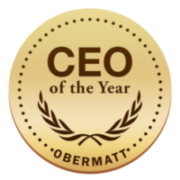
The Gold Winners 2017 by category are the following CEOs:
LARGE COMPANIES
Category Combined Performance ( Growth Sales + Profitability + Investment)
German Gref, Chairman of the Board «Sberbank Rossii» 95 %
Andrey Murov, Chairman of the Board
PAO «Federalnaya Setevaya Kompaniya Edinoy Energeticheskoy Sistemy» 91 %
Vladimir Vlasov, CEO “Mostotrest” 88 %
LARGE COMPANIES
Category Investment/ Total Shareholder Return Growth Performance
Vitaly Saveliev, CEO «Аeroflot» 100 %
Аndrey Мurov, Chairman of the Board
PAO «Federalnaya Setevaya Kompaniya Edinoy Energeticheskoy Sistemy» 100 %
Boris Kovalchuk, Chairman of the Board «Inter RАО ЕES» 100 %
Dmitry Pogrebinsky, CEO «Protek» 100 %
Oleg Korzhov, President, CEO «Mechel» 100%
LARGE COMPANIES
Category Sales Growth Performance
Andrey Kostin, Chairman of the Board «VTB Bank» 96 %
Pavel Grachev, CEO «Polus Zoloto» 94 %
German Gref, Chairman of the Board «Sberbank Rossii» 92 %
LARGE COMPANIES
Category Profit Growth
Pavel Grachev, CEO «Polus Zoloto» 97%
German Gref, Chairman of the Board «Sberbank Rossii» 96%
Andrey Kostin, Chairman of the Board «VTB Bank» 92%
Yuriy Slyusar, President «Ob’edinennaya Aviastroitelnaya Korporatsiya» 92%
MEDIUM-SIZED COMPANIES
Category Combined Performance ( Growth Sales + Profitability + Investment)
Kirill Minovalov, Chairman of the Board, Bank «Аvangard» 91%
Коnstantin Basmanov, Chairman of the Board, Bank «Vozrozhdenie» 89%
Dmitry Оlyunin, Chairman of the Board «Rosbank» 89%
MEDIUM-SIZED COMPANIES
Category Profit Growth
Dmitry Melnikov, CEO, «Solikamsky magnievy zavod» 100% Konstantin Basmanov, Chairman of the Board, Bank «Vozrozhdenie» 98%
Roman Savushkin, CEO, «Nauchno-proizvodstvennaya korporatsiya
«Оb’edinennaya Vagonnaya Kompaniya» 96%
Dmitry Оlyunin, Chairman of the Board, «Rosbank» 96%
Sergey Кalinin, CEO «Hals Development» 96%
MEDIUM-SIZED COMPANIES
Category Sales Growth Performance
Sergey Кalinin, CEO «Hals Development» 100%
Vladimir Kintsurashvili, CEO «Aptechnaya set 36,6» 97%
Коnstantin Basmanov, Chairman of the Board, Bank «Vozrozhdenie» 96%
MEDIUM-SIZED COMPANIES
Category Investment/ Total Shareholder Return Growth Performance
Andrey Ershov, CEO «Moskovskaya gorodskaya telephonnaya set» 100%
Andrey Molchanov,CEO Gruppa LSR 100%
Nikolay Molibog, CEO «RBC» 100%
Zürich, 28 September 2017
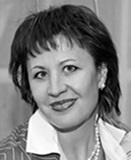
Phone +41 44 448 41 24; +7 916 732 3815, elena.groshkova@brainforce-ag.com
How to Successfully Develop and Retain Employees in China
How to Successfully Develop and Retain Employees in China at the Example of Swiss Company Schindler

With this question as the theme, on September 7th 2017, the Business Club Shanghai gathered around 30 high-level management executives from multinationals and SME’s of various industries together in Shanghai Hilton Hotel with our first female keynote speaker Mrs. Tansy TONG delivering the facts and solutions applied within SCHINDLER China.
The topic attracted heated discussions and exchanges and the event came to a successful end with the birthday celebration for our keynote speaker.
About the Business Club Shanghai
The Business Club Shanghai is providing a platform for sharing views and experiences at business leader’s level. The Business Club in Shanghai follows the successful tradition of the Business Clubs in Zurich (Switzerland), Vienna (Austria) and Munich (Germany). The series has been initiated by Brainforce International, the leading Swiss-based Interim Management provider with its fully owned subsidiary in Shanghai and Oehen PR, the management consultancy for Public Relations, bridging Chinese and Swiss business matters.
